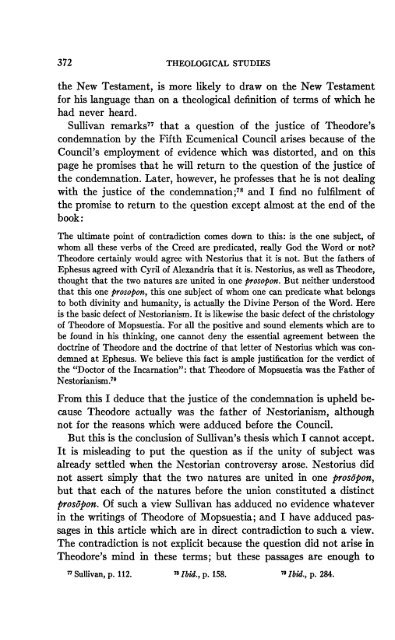ANNOTATIONS ON THE CHRISTOLOGY OF THEODORE OF ...
ANNOTATIONS ON THE CHRISTOLOGY OF THEODORE OF ...
ANNOTATIONS ON THE CHRISTOLOGY OF THEODORE OF ...
Create successful ePaper yourself
Turn your PDF publications into a flip-book with our unique Google optimized e-Paper software.
372 <strong>THE</strong>OLOGICAL STUDIES<br />
the New Testament, is more likely to draw on the New Testament<br />
for his language than on a theological definition of terms of which he<br />
had never heard.<br />
Sullivan remarks 77 that a question of the justice of Theodore's<br />
condemnation by the Fifth Ecumenical Council arises because of the<br />
Council's employment of evidence which was distorted, and on this<br />
page he promises that he will return to the question of the justice of<br />
the condemnation. Later, however, he professes that he is not dealing<br />
with the justice of the condemnation; 78 and I find no fulfilment of<br />
the promise to return to the question except almost at the end of the<br />
book:<br />
The ultimate point of contradiction comes down to this: is the one subject, of<br />
whom all these verbs of the Creed are predicated, really God the Word or not?<br />
Theodore certainly would agree with Nestorius that it is not. But the fathers of<br />
Ephesus agreed with Cyril of Alexandria that it is. Nestorius, as well as Theodore,<br />
thought that the two natures are united in one prosopon. But neither understood<br />
that this one prosopon, this one subject of whom one can predicate what belongs<br />
to both divinity and humanity, is actually the Divine Person of the Word. Here<br />
is the basic defect of Nestorianism. It is likewise the basic defect of the christology<br />
of Theodore of Mopsuestia. For all the positive and sound elements which are to<br />
be found in his thinking, one cannot deny the essential agreement between the<br />
doctrine of Theodore and the doctrine of that letter of Nestorius which was condemned<br />
at Ephesus. We believe this fact is ample justification for the verdict of<br />
the "Doctor of the Incarnation": that Theodore of Mopsuestia was the Father of<br />
Nestorianism. 79<br />
From this I deduce that the justice of the condemnation is upheld because<br />
Theodore actually was the father of Nestorianism, although<br />
not for the reasons which were adduced before the Council.<br />
But this is the conclusion of Sullivan's thesis which I cannot accept.<br />
It is misleading to put the question as if the unity of subject was<br />
already settled when the Nestorian controversy arose. Nestorius did<br />
not assert simply that the two natures are united in one prosopon,<br />
but that each of the natures before the union constituted a distinct<br />
prosopon. Of such a view Sullivan has adduced no evidence whatever<br />
in the writings of Theodore of Mopsuestia; and I have adduced passages<br />
in this article which are in direct contradiction to such a view.<br />
The contradiction is not explicit because the question did not arise in<br />
Theodore's mind in these terms; but these passages are enough to<br />
77 Sullivan, p. 112.<br />
78 Ibid., p. 158.<br />
79 Ibid., p. 284.
















